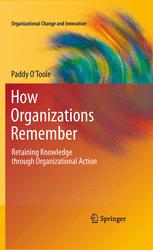

Most ebook files are in PDF format, so you can easily read them using various software such as Foxit Reader or directly on the Google Chrome browser.
Some ebook files are released by publishers in other formats such as .awz, .mobi, .epub, .fb2, etc. You may need to install specific software to read these formats on mobile/PC, such as Calibre.
Please read the tutorial at this link: https://ebookbell.com/faq
We offer FREE conversion to the popular formats you request; however, this may take some time. Therefore, right after payment, please email us, and we will try to provide the service as quickly as possible.
For some exceptional file formats or broken links (if any), please refrain from opening any disputes. Instead, email us first, and we will try to assist within a maximum of 6 hours.
EbookBell Team

4.3
88 reviewsHow an organization works is largely a function of what it knows—i.e., the collective knowledge about all aspects of the enterprise, from competitive intelligence to formal systems and policies to the ways in which individuals solve problems and share their expertise. Organizational knowledge is not to be found in manuals and web sites, but in the day-to-day interactions among employees, suppliers, customers, investors, and other stakeholders. How Organizations Remember is based on a 10-month study of a technology firm with locations in three countries (Australia, US, and Ireland); the company has undergone rapid growth and expansion, which have had a profound impact on power structures and organizational culture, and hence, on the ways in which knowledge is created and disseminated. The author discovered that what is remembered is diverse, and of differing value within and across the organization. How knowledge is remembered is equally diverse, and ranges from computer files to cartoons on the wall, from stories to the way objects are placed on a desk. Knowledge is influenced by external influences as well as internal influences; knowledge may become a competitive advantage, but may also contribute to inertia. The book combines theoretical perspectives and empirical findings to generate insights that contribute to both research and practice in organizational learning, innovation, culture, and behavior.